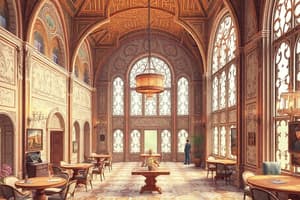Podcast
Questions and Answers
Which period in history is characterized by the emergence of powerful monarchies and the growth of feudalism?
Which period in history is characterized by the emergence of powerful monarchies and the growth of feudalism?
- Renaissance
- World Wars
- Ancient Civilizations
- Medieval History (correct)
During which period did the intellectual and artistic movement known as the Renaissance take place?
During which period did the intellectual and artistic movement known as the Renaissance take place?
- Cold War
- Ancient Civilizations
- Medieval History
- Renaissance (correct)
Which historical era was marked by events such as the Black Death and the Hundred Years' War?
Which historical era was marked by events such as the Black Death and the Hundred Years' War?
- Renaissance
- Medieval History (correct)
- Cold War
- World Wars
Which period laid the foundation for the world with advancements in agriculture, writing, and the rise of empires?
Which period laid the foundation for the world with advancements in agriculture, writing, and the rise of empires?
In which historical period did the Age of Exploration result from the intellectual and artistic advancements of the time?
In which historical period did the Age of Exploration result from the intellectual and artistic advancements of the time?
When did World War II take place?
When did World War II take place?
Which conflict ended with the signing of the Treaty of Versailles?
Which conflict ended with the signing of the Treaty of Versailles?
What marked the conclusion of the Cold War?
What marked the conclusion of the Cold War?
Which major power was not involved in World War II?
Which major power was not involved in World War II?
When did the Cold War start?
When did the Cold War start?
Flashcards are hidden until you start studying
Study Notes
Exploring Human History
Human history, a tapestry woven with countless events, cultures, and eras, invites us on a journey through time as we uncover the stories of our collectively rich past. In this exploration, we'll focus on five significant periods:
Ancient Civilizations
Our story begins with the birth of civilization itself. From the intricate pyramids of ancient Egypt to the grandeur of Mesopotamia's city-states and the philosophical wisdom of the Greeks, these early civilizations left indelible marks on the human landscape. The advent of agriculture, writing, and the rise of empires paved the way for the world that followed.
Medieval History
Medieval times, also known as the Middle Ages, were marked by a period of great change and complexity. This era, spanning from the fall of Rome to the Renaissance, saw the growth of feudalism, the emergence of powerful monarchies, and the rise of the Church's influence. The Black Death, the Crusades, and the Hundred Years' War are just a few of the events that shaped this period.
Renaissance
The Renaissance, meaning "rebirth," was an intellectual and artistic movement that emerged in the 14th century and lasted until the 17th century. This period of cultural revival gave birth to the sciences, humanities, and the arts. The Renaissance would eventually lead to the discovery of the New World and the Age of Exploration.
World Wars
The 20th century was bookended by two of the most devastating conflicts in human history: World War I and World War II. World War I, also referred to as the Great War, began in 1914 and lasted until 1918. This conflict, fought between the Allies and the Central Powers, ended with the signing of the Treaty of Versailles. World War II, which took place from 1939 to 1945, was a global conflict that involved virtually every major power in the world. As a result of these wars, international organizations like the United Nations were established, and the world entered a new era of global politics and cooperation.
Cold War
The Cold War, an ideological conflict between the West and the Eastern Bloc, began in 1947 and lasted until 1991. This period of tension between the United States, its allies, and the Soviet Union and its satellite states was marked by proxy wars, espionage, and arms races. The Cold War's conclusion, brought about by the fall of the Berlin Wall and the collapse of the Soviet Union, signaled the end of an era and the dawn of a new age of globalization and interdependence.
In summary, human history is a grand narrative of cultures, conflicts, and ideologies that have shaped the world we live in today. By examining these pivotal periods, we can better understand both the past and the present, as we continue to write the next chapter of our shared human story.
Studying That Suits You
Use AI to generate personalized quizzes and flashcards to suit your learning preferences.




